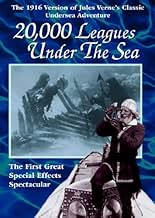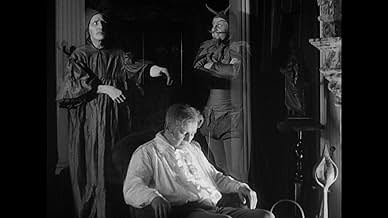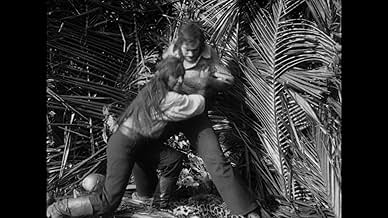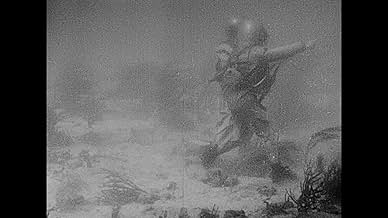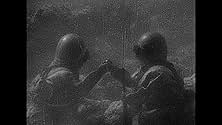IMDb RATING
6.1/10
2.1K
YOUR RATING
A French professor and his daughter accompany Captain Nemo on an adventure aboard a submarine.A French professor and his daughter accompany Captain Nemo on an adventure aboard a submarine.A French professor and his daughter accompany Captain Nemo on an adventure aboard a submarine.
- Awards
- 1 win total
William Welsh
- Charles Denver
- (as William Welch)
Wallis Clark
- Pencroft
- (as Wallace Clark)
Joseph W. Girard
- Maj. Cameron
- (uncredited)
Ole Jansen
- Undetermined Secondary Role
- (uncredited)
Noble Johnson
- Undetermined Secondary Role
- (uncredited)
Leviticus Jones
- Neb
- (uncredited)
Martin Murphy
- Herbert Brown
- (uncredited)
Jack Tornek
- Undetermined Secondary Role
- (uncredited)
- Director
- Writers
- All cast & crew
- Production, box office & more at IMDbPro
Featured reviews
20,000 Leagues Under the Sea (1916) was a movie of firsts. It was the first feature length adaptation of Jules Vernes classic and was also the very first movie to film underwater.
Alas the troubles of this silent movie became apparent quite early on, namely that it's not exactly loyal to the source material. If you're expecting something strongly resembling the book then this may be an adaptation worth skipping over.
Now as mentioned this is a silent film (Entirely even devoid of music) which I'll be honest I've never liked. It's not anything snobbish or any expectations that I impose on a film, it's more that sitting for 90 minutes odd in silence gives me a migraine.
For this reason I watched this in sections and when the credits rolled I still managed to acquire a migraine and wasn't overly impressed with what I saw.
Considering it's age the majority looks fantastic as does the underwater filming. Certain parts struggle and it's unclear everything that is taking place but thankfully unlike 1907's version they are few and far between.
20,000 Leagues Under the Sea is a passable attempt at a grandiose tale and the first of many many adaptations.
The Good:
Revolutionary for its time
The Bad:
Something about silent film gives me a headache
Not loyal to the original book
Alas the troubles of this silent movie became apparent quite early on, namely that it's not exactly loyal to the source material. If you're expecting something strongly resembling the book then this may be an adaptation worth skipping over.
Now as mentioned this is a silent film (Entirely even devoid of music) which I'll be honest I've never liked. It's not anything snobbish or any expectations that I impose on a film, it's more that sitting for 90 minutes odd in silence gives me a migraine.
For this reason I watched this in sections and when the credits rolled I still managed to acquire a migraine and wasn't overly impressed with what I saw.
Considering it's age the majority looks fantastic as does the underwater filming. Certain parts struggle and it's unclear everything that is taking place but thankfully unlike 1907's version they are few and far between.
20,000 Leagues Under the Sea is a passable attempt at a grandiose tale and the first of many many adaptations.
The Good:
Revolutionary for its time
The Bad:
Something about silent film gives me a headache
Not loyal to the original book
I found this film extraordinary, if for no other reason than the fact, that that they used underwater photography showing divers in deep sea helmets using what looked to be rifles with spears attached (early spear guns, I imagine) actually shooting at a large group of sharks swimming around them. I also didn't see any air lines attached to any of these divers, however, if you looked closely, you could see some air bubbles come out of the helmets of the divers every so often. They must have been using some type of compressed air with a regulator, however when I queried Google, I was informed that SCUBA wasn't invented until 1939 for the US Navy and the air regulator hadn't been invented until 1943 by Jacques Cousteau. There was a device that contained compressed air in a belt attached to a diver's helmet that was invented in 1825 but that would only allow a diver to stay under 7 minutes. Were they really able to get all of the shots with the divers within that time frame. Very curious. Does anyone have the technical details for how this film was accomplished? I give this film a 9 for technology and a 5 for story line and acting for a 7 overall.
First retelling based on Jules Verne's fantasy-adventure novel with unknown cast and extraordinary scenarios . Silent take on for cinema , filmed in on location in Bahamas . When Jules Verne wrote this famed novel , the startling inventions impressed the world as being the limit of imagination and impossibility . The scenes were made possible by the Williamson Brothers inventions with submarine photoplay ever filmed . The film talks about the known story from Jules Verne novel , a real masterpiece ; 1868 ,the oceans are no longer safe , many ships have been lost, the sailors have returned to New England's fishing port with tales of vicious giant whale with long horn . The naturist and biologist expert named professor Pierre Aronnax and his daughter undertake a dangerous mission . Aronnax , his daughter , along with a professional whaler and famous harpoonist named Ned Land join forces in an expedition commanded by captain Farragut that attempt to unravel the mysterious sinking ships by an unknown creature . Aboard the ship called USS Abrahan Lincoln , they go out to investigate . At sea, Professor Aronnax was aboard the ship when Nautilus rammed it and threw the Professor, his helper and Ned Land into the water . They are captured and get thoroughly involved with power-hungry captain Nemo (Allen Hollubar, being in Disney version masterfully played by James Mason) and take an extraordinary adventure underseas in an advanced submarine called Nautilus . Prisoners at first, they are now treated as guests to view the underwater world and to hunt under the waves. Nemo will also tells them about the riveting submarine of the future and the revenge that has driven him for all these years . Our heroes get stuck in the ship , undergoing numerous adventures and suffering innumerable perils .
Exciting and thrilling submarine movie dealing with the Nautilus captained by Nemo , rendition from ¨20,000 Leagues¨, but also another Verne novel, ¨Mysterious Island¨, so the result is that there are two diverse tales taking place which don't at all seem to fit together, until ultimately they come together in the strange conclusion, which makes little relation in respect to the original classic . It displays sensational adventures , drama , marvelous scenarios and is enjoyable but dated . This film became famous for its groundbreaking work in actual underwater photography by George M. Williamson and J. Ernest Williamson who alone had solved the secret under-water sea photography . The actual undersea footage was shot in the Bahamas due to the unusually clear water . When this film was remade by Walt Disney 38 years later, they came to this same spot for their undersea footage . Fascinating submarine movie blends action , disaster spectacle, hokey fun , suspense and emotional happenings . Surprise-filled entertainment and with plenty of action on grand scale with breathtaking special effects by that time and some ships and submarine by maquette or scale model and filmed in Leonia, New Jersey, Universal Studios , Universal City, California, and New Providence Island, Bahamas . The underwater scenes , sea animals , flamboyant FX to make large-size Octopus seem like horrible monster , all of them are spectacular and the film is an early Hollywood product . However , a confuse plot and overlong runtime became a little boring film . This vintage story was regularly directed by Stuart Paton , it results to be an old mute (1916) with archaeological interest . The motion picture will appeal to fantasy-adventure buffs and silent movie aficionados .
The best adaptation turns out to be the Walt Disney production (1954) , marvelously directed by Richard Fleischer , James Mason plays a serious revenger captain Nemo ; Paul Lukas plays perfectly Annorax as intelligent scientific ; and Ned Land played by Kirk Douglas as a stubborn sailor who spends most of their time devising intelligent ways for escape . Other versions from this unforgettable novel are the following : for TV (1997) directed by Rod Hardy with Michael Caine , Mia Sara and Patrick Dempsey ; and another Television film (1997) directed by Michael Anderson with Ben Cross and Richard Crenna ; furthermore a cartoon movie directed by Arthur Rankin.
Exciting and thrilling submarine movie dealing with the Nautilus captained by Nemo , rendition from ¨20,000 Leagues¨, but also another Verne novel, ¨Mysterious Island¨, so the result is that there are two diverse tales taking place which don't at all seem to fit together, until ultimately they come together in the strange conclusion, which makes little relation in respect to the original classic . It displays sensational adventures , drama , marvelous scenarios and is enjoyable but dated . This film became famous for its groundbreaking work in actual underwater photography by George M. Williamson and J. Ernest Williamson who alone had solved the secret under-water sea photography . The actual undersea footage was shot in the Bahamas due to the unusually clear water . When this film was remade by Walt Disney 38 years later, they came to this same spot for their undersea footage . Fascinating submarine movie blends action , disaster spectacle, hokey fun , suspense and emotional happenings . Surprise-filled entertainment and with plenty of action on grand scale with breathtaking special effects by that time and some ships and submarine by maquette or scale model and filmed in Leonia, New Jersey, Universal Studios , Universal City, California, and New Providence Island, Bahamas . The underwater scenes , sea animals , flamboyant FX to make large-size Octopus seem like horrible monster , all of them are spectacular and the film is an early Hollywood product . However , a confuse plot and overlong runtime became a little boring film . This vintage story was regularly directed by Stuart Paton , it results to be an old mute (1916) with archaeological interest . The motion picture will appeal to fantasy-adventure buffs and silent movie aficionados .
The best adaptation turns out to be the Walt Disney production (1954) , marvelously directed by Richard Fleischer , James Mason plays a serious revenger captain Nemo ; Paul Lukas plays perfectly Annorax as intelligent scientific ; and Ned Land played by Kirk Douglas as a stubborn sailor who spends most of their time devising intelligent ways for escape . Other versions from this unforgettable novel are the following : for TV (1997) directed by Rod Hardy with Michael Caine , Mia Sara and Patrick Dempsey ; and another Television film (1997) directed by Michael Anderson with Ben Cross and Richard Crenna ; furthermore a cartoon movie directed by Arthur Rankin.
This may have been thrilling in 1916, but today it seems more of a curio. The Williamson brothers invented a camera to take pictures underwater, (the prologue tells us, complete with photos of them) so there's lots of shots of fish swimming, the bottom of the sea, men in diving suits and one battle with an octopus, which was a bit fuzzy. Still, the sense of watching movie history was strong, but don't expect too much in light of more modern techniques. What really bothered me was the hammy acting styles, with lots of arm motions and exaggerated facial features. It's the style that gave silent films a bad name. One who avoided this was Matt Moore, the hero of the film, and the only actor I recognized. Perhaps that is why he was still making movies in the 50's. The film uses plot elements of Verne's "The Mysterious Island" as well as "Twenty Thousand Leagues Under the Sea."
Underwater films are as popular today as ever in movie theaters. These motion pictures lend even the most of us landlubbers an idea how the ocean underneath the waves looks. The first feature movie to contain underwater footage is December 1916's "20,000 Leagues Under The Sea." This Jules Verne-based picture was the cinematic debut of screening submerged film footage, showing divers, a fake octopus, fish, including sharks and seabed scenery to amaze viewers back at a time when no one had ever seen under-the-ocean moving images before.
Brothers George and J. Ernest Williamson in 1914 made their experimental film, "Terrors of the Deep," also named "Thirty Leagues Under The Sea," using their newly-invented camera containing reflector mirrors running down a long tube to shoot underwater footage in the clear, relatively shallow waters of the Bahamas. An illuminating light next to the tube's lower end allowed the film to capture a moving world where no motion picture crew had been able to photograph before. The brothers promised investors who had put money into the project they would show a diver killing a shark. To make that happened, they dangled a dead horse over the side of their boat to attrack the predators. It worked.
Universal FIlm Company loved the Williamson film so much they made plans to base the underwater footage the brothers were assigned to shoot around an 1870 Jules Verne book, "20,000 Leagues Under The Sea," with director/actor Stuart Paton playing Captain Nemo. Actually, the movie was the merging of two Verne novels, "Leagues" and "The Mysterious Island."
The Williamsons returned to the Bahamas to shot scenes dictated by the script. Disney's 1954 film crew for its "20,000 Leagues Under The Sea" returned to the same spot in the Bahamas to shoot its underwater footage. The sprawling 1916 film was expensive to make in its two-year production, which included a flashback sequence towards the end employing hundreds of extras amidst elaborate India-style sets. The movie, although extremely popular, never produced a profit, discouraging Hollywood from making another Verne film for 12 years until ironically the part-talkie, two-color Technicolor MGM's "The Mysterious Island" was released in 1929.
Brothers George and J. Ernest Williamson in 1914 made their experimental film, "Terrors of the Deep," also named "Thirty Leagues Under The Sea," using their newly-invented camera containing reflector mirrors running down a long tube to shoot underwater footage in the clear, relatively shallow waters of the Bahamas. An illuminating light next to the tube's lower end allowed the film to capture a moving world where no motion picture crew had been able to photograph before. The brothers promised investors who had put money into the project they would show a diver killing a shark. To make that happened, they dangled a dead horse over the side of their boat to attrack the predators. It worked.
Universal FIlm Company loved the Williamson film so much they made plans to base the underwater footage the brothers were assigned to shoot around an 1870 Jules Verne book, "20,000 Leagues Under The Sea," with director/actor Stuart Paton playing Captain Nemo. Actually, the movie was the merging of two Verne novels, "Leagues" and "The Mysterious Island."
The Williamsons returned to the Bahamas to shot scenes dictated by the script. Disney's 1954 film crew for its "20,000 Leagues Under The Sea" returned to the same spot in the Bahamas to shoot its underwater footage. The sprawling 1916 film was expensive to make in its two-year production, which included a flashback sequence towards the end employing hundreds of extras amidst elaborate India-style sets. The movie, although extremely popular, never produced a profit, discouraging Hollywood from making another Verne film for 12 years until ironically the part-talkie, two-color Technicolor MGM's "The Mysterious Island" was released in 1929.
Did you know
- TriviaUnderwater cameras were not used. The Williamson brothers had developed a system of watertight tubes and mirrors, like an upside-down periscope, and were dependent on the clarity of water and sunshine to provide the necessary light.
- GoofsIn one scene on the island the balloon survivors are at a table and a black servant appears. He never shows up again and is not rescued at the end of the film with the rest of the survivors.
- Quotes
Capt. Nemo: I am Captain Nemo and this is my submarine, 'Nautilus'... It has pleased me to save your lives... You are my prisoners.
- Crazy creditsThe opening titles announce "The First Submarine Photoplay Ever Filmed".
- Alternate versionsKino International released a video with a music soundtrack by Alexander Rannie and Brian Benison (music © 1991). Running time is 101 minutes.
- ConnectionsFeatured in Hollywood Aliens & Monsters (1997)
Details
Box office
- Budget
- $200,000 (estimated)
- Runtime1 hour 25 minutes
- Sound mix
- Aspect ratio
- 1.33 : 1
Contribute to this page
Suggest an edit or add missing content

Top Gap
By what name was 20,000 Leagues Under the Sea (1916) officially released in India in English?
Answer
